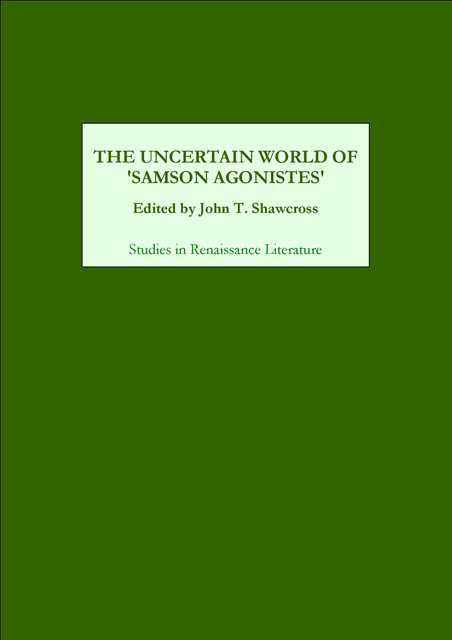Book contents
- Frontmatter
- Contents
- Preface
- Chapter 1 The World of Samson Agonistes
- Chapter 2 Uncertainty and the Text
- Chapter 3 The Dramatic Work and its Reading
- Chapter 4 Samson: God’s Champion, a Type, or Individual?
- Chapter 5 Dalila: Seductress or Wife?
- Chapter 6 Politics in the Destabilized Text
- Chapter 7 Biographical Intrusions
- Chapter 8 The Uncertainties of Irony
- Chapter 9 A Hermeneutics of the Text
- Chapter 10 Samson Agonistes and Consistencies of Belief
- Works Cited
- Index
Chapter 3 - The Dramatic Work and its Reading
Published online by Cambridge University Press: 22 March 2023
- Frontmatter
- Contents
- Preface
- Chapter 1 The World of Samson Agonistes
- Chapter 2 Uncertainty and the Text
- Chapter 3 The Dramatic Work and its Reading
- Chapter 4 Samson: God’s Champion, a Type, or Individual?
- Chapter 5 Dalila: Seductress or Wife?
- Chapter 6 Politics in the Destabilized Text
- Chapter 7 Biographical Intrusions
- Chapter 8 The Uncertainties of Irony
- Chapter 9 A Hermeneutics of the Text
- Chapter 10 Samson Agonistes and Consistencies of Belief
- Works Cited
- Index
Summary
THE dramatic character (in a dramatic work as well as on the stage) operates with its own integrity. That “integrity” may ultimately define a pernicious, lying deceitful person within the literary work, but that person must be understood from that dramatic character’s own existence, not from some prejudgment. (Compare, for instance, Iago in Shakespeare’s Othello or Thersites in Troilus and Cressida.) Of course, an author may be doctrinaire and offer only a mouthpiece for personal views or a figure espousing opposed views which are to be negated (or even ridiculed) in the course of the action. But generally a dramatic character takes on its own life, a personality that acts and thinks in definition of that individual being. Some characters will be better defined than others, those who are leading performers in the drama; some will be defined largely in relationship with the leading performers. In Samson Agonistes it is Samson who is the leading character with Manoa, Dalila, and Harapha as other characters whose relationship with him in the work define a reading of them. Manoa and Dalila (as Delilah) have prepoem existences that are recalled in the narratives recounting the past. Are their existences in the present the same as their existences in the past? Do not their existences in the present offer dramatic characters with their own integrity within the drama? Are they not different from the figures of the biblical story? The Public Officer and the Messenger are functionary only, offering nothing of individual selves, and the Chorus operating as a voice and in the exodos as two voices is defined in relationship to Samson, but it also exhibits a variability, a mercurial stance depending on the specific circumstance in which and with whom Samson is involved. Its “integrity” is there though based on reaction. Some criticism has seen the Chorus as Milton’s voice, not recognizing its reactive stance and its inconsistencies.
The lack of attention to dramatic characters in looking at Milton’s dramatic poem and its author is a common critical failure of readers of this work. Since Milton’s God is Samson’s God, since Milton emphasized marriage and “companionship of mind,” Samson has been seen primarily in positive terms within the poem, and Dalila only in negative ones. Readers of Milton’s works seldom seem to entertain the possibility that he and his text offer ambiguity rather than personal ideological positions.
- Type
- Chapter
- Information
- The Uncertain World of Samson Agonistes , pp. 35 - 47Publisher: Boydell & BrewerPrint publication year: 2001

